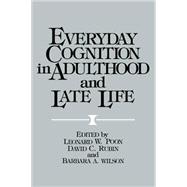
Note: Supplemental materials are not guaranteed with Rental or Used book purchases.
Purchase Benefits
What is included with this book?
| Part I. Adult Cognitive Abilities in the Laboratory and in Real-life Settings: Basic Theoretical and Methodological Issues | |
| 1. Introduction to Part I: the how, when and why of studying everyday cognition David C. Rubin | |
| Part IA. Systematic Approaches to Laboratory and Real-world Research: 2. Representative design and the quality of generalization Lewis Petrinovich | |
| 3. The myth of external validity Douglas G. Mook | |
| 4. Functional explanations of memory Darryl Bruce | |
| 5. General systems theory: a rationale for the study of everyday memory Jan D. Sinnott | |
| Part IB. Combining Laboratory and Real-world Research: 6. The laboratory and ecology: supplementary sources of data for memory research Harry P. Bahrick | |
| 7. Issues of regularity and control: confessions of a regularity freak David C. Rubin | |
| 8. Finding the bloody horse Alan Baddeley | |
| 9. Some bad and some good reasons for studying memory and cognition in the wild Thomas K. Landauer | |
| Part II. Cognition in Adulthood and Late Life: Findings in Real-life Settings: 10. Introduction to Part II: What do we know about the aging of cognitive abilities in everyday life? Leonard W. Poon | |
| Part IIA. Everyday Cognitive Abilities: 11. Memory for prose: perspectives on the reader Joellen T. Hartley | |
| 12. Prose processing in adulthood: the text, the reader and the task Bonnie J. F. Meyer and G. Elizabeth Rice | |
| 13. Speech comprehension and memory through adulthood: the roles of time and strategy Elizabeth Lotz Stine, Arthur Wingfield and Leonard W. Poon | |
| 14. The effects of aging on perceived and generated memories Gillian Cohen and Dorothy Faulkner | |
| 15. Aging and word retrieval: naturalistic, clinical and laboratory data Nancy L. Bowles, Loraine K. Obler and Leonard W. Poon | |
| 16. Acquisition and utilization of spatial information by elderly adults: implications for day-to-day situations Kathleen C. Kirasic | |
| 17. Inner-city decay? Age changes in structure and process in recall of familiar topographical information Patrick Rabbitt | |
| 18. The cognitive ecology of problem solving Alan A. Hartley | |
| 19. Everyday problem solving: methodological issues, research findings and a model Nancy Wadsworth Denney | |
| 20. Prospective/intentional memory and aging: memory as adaptive action Jan D. Sinnott | |
| Part IIB. Concomitant Influences: 21. Motivation and aging Lawrence C. Perlmuter and Richard A. Monty | |
| 22. Questionnaire research on metamemory and aging: issues of structure and function Roger A. Dixon | |
| 23. The importance of awareness in memory aging John C. Cavanaugh | |
| 24. Age and expertise: responding to Talland's challenge Neil Charness | |
| 25. World-knowledge systems Cameron J. Camp | |
| 26. Comments on aging memory and its everyday operations Donald H. Kausler | |
| Part III. Cognitive Enhancement and Aging: Clinical and Educational Applications: 27. Introduction to Part III: approaches to practical applications Barbara A. Wilson and Leonard W. Poon | |
| Part IIIA. Issues and Perspectives: 28. Varieties of memory compensation by older adults in episodic remembering Lars Bä | |
| ckman | |
| 29. Improvement with cognitive training: which old dogs learn what tricks? Sherry L. Willis | |
| Part IIIB. Enhancement Approaches: 30. Planning practical memory training for the aged Robin L. West | |
| 31. Mnemonics as modified for use by the elderly Jerome A. Yesavage, Danielle Lapp and Javaid I. Sheikh | |
| Part IIIC. Designing Programs for Cognitive Rehabilitation: 32. Designing memory-therapy programs Barbara A. Wilson | |
| 33. Management of memory problems in a hospital setting Nadina B. Lincoln | |
| 34. Home-based cognitive rehabilitation with the elderly Nicholas J. Moffat | |
| 35. Memory retraining: everyday needs and future prospects Herbert F. Crovitz | |
| Indexes. |
The New copy of this book will include any supplemental materials advertised. Please check the title of the book to determine if it should include any access cards, study guides, lab manuals, CDs, etc.
The Used, Rental and eBook copies of this book are not guaranteed to include any supplemental materials. Typically, only the book itself is included. This is true even if the title states it includes any access cards, study guides, lab manuals, CDs, etc.